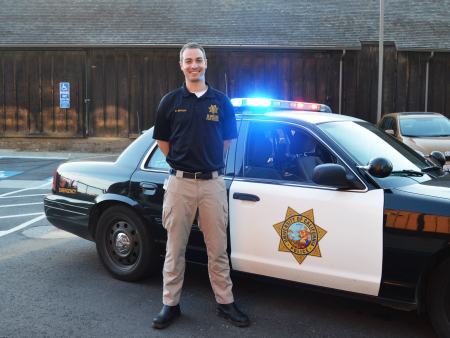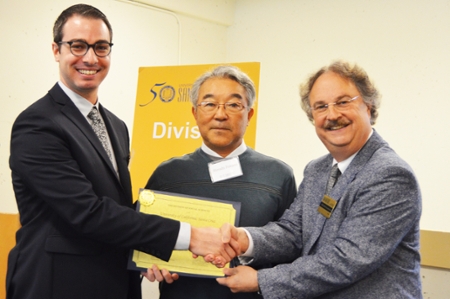By day, Ean Brown is a sociology major and legal studies minor at UC Santa Cruz studying national security. By night, he is a student ambassador for the campus police department where he works the late shift, serving as a night safety escort, patrolling McHenry library, or riding along with his mentor, Officer Nathaniel “Jack” Calhoun.
Public safety underscores Brown’s work: inside and outside the classroom.
Prior to enrolling at UC Santa Cruz, Brown worked as an EMT. He spent a year as an ER technician in a level one trauma center. During summer months, he lifeguarded. When he transferred to UC Santa Cruz in 2014, he enrolled in Citizens Academy and soon after joined the ambassador program where he serves as one of 18 undergraduate student liaisons between the police department and the student body.
“Working for the UC Police Department has been a really good experience,” says the sociology major interested in criminology, deviance, and the law. “It has given me a well rounded picture of policing.”
But there are certain aspects of governance that trouble Brown.
“As soon as he was exposed to global surveillance disclosures released in 2013 by Edward Snowden in my “Race and Law” class, he immediately began to work on a research paper to understand the extent of the NSA’s indiscriminate electronic surveillance program in the U.S. and beyond,” says Hiroshi Fukurai, Brown’s faculty advisor.
This research paper lead to 32 Years After Orwellian “1984”: The Surveillance State and National Security, Brown’s award-winning senior thesis about government surveillance practices revealed in documents leaked by Edward Snowden and Chelsea Manning. Brown raises concerns about balancing civil liberties and constitutional rights with national security and public safety—the very service he is committed to providing.
While policing is built on surveillance, it can become slippery slope, Brown shares.
“Government surveillance undoubtedly complicates issues of legality and policy reform. Constitutionally, these surveillance programs challenge the limits of law because they may facilitate illegals searches and seizures as well as hamper freedom of speech,” he writes.
Intellectual freedom was something Brown faced when he wrote the paper.
There were moments when he felt paranoid just researching the topic of his paper, he says. Was his internet browsing history going to be flagged? Could he find himself in a compromised situation just for searching the web for the sensitive topics Snowden and Manning revealed in their leaks?
“This type of self-policing is dangerous to knowledge and personal curiosity,” says Brown.
In the paper, Brown makes bold policy suggestions, calling for stricter definitions for hot issues like privacy and national security.
“The courts specifically need to catch up and recognize the role technology plays in society by granting better protections under the Fourth Amendment,” writes Brown.
Earlier this year, Brown presented his research and policy recommendations at the Pacific Sociological Association annual meeting in Oakland. He was the only undergraduate student from across the UCs to present at the conference. Brown’s paper also earned him a prestigious Dean's Award at UC Santa Cruz, a recognition from the campus for outstanding undergraduate student research.
Brown will be graduating in 2016 and plans to continue working in public safety.
“He is well liked by everyone in the police department - from the chief to our citizens academy students,” says Officer Calhoun. “He is approachable, patient and has a solid head on his shoulder. All of these, in my opinion, are essential attributes to being a successful public safety professional.”
“You make an immediate difference in someone’s life,” Brown says about working in public service. He hopes to build from the experiences gained in the police department including community relations, leadership, and peacekeeping.

